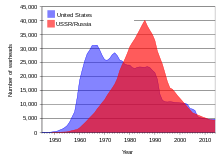Team B was a competitive analysis exercise commissioned by the Central Intelligence Agency (CIA) to analyze threats the Soviet Union posed to the security of the United States. It was created, in part, due to a 1974 publication by Albert Wohlstetter, who accused the CIA of chronically underestimating Soviet military capability. Years of National Intelligence Estimates (NIE) that were later demonstrated to be very wrong were another motivating factor.
President Gerald Ford began the Team B project in May 1976, inviting a group of outside experts to evaluate classified intelligence on the Soviet Union. Team B, approved by then-Director of Central Intelligence George H. W. Bush, was composed of "outside experts" who attempted to counter the arguments of intelligence officials within the CIA.[1] The intelligence community was in the process of putting together its own assessment at the same time.

Team B concluded that the NIE on the Soviet Union, compiled and produced annually by the CIA, chronically underestimated Soviet military power and misinterpreted Soviet strategic intentions. Its findings were leaked to the press shortly after Jimmy Carter's 1976 presidential election win in an attempt to appeal to staunch anticommunists in both parties and also not to appear partisan.[4][5] The Team B reports became the intellectual foundation for the idea of "the window of vulnerability" and of the massive arms buildup that began toward the end of the Carter administration and accelerated under President Ronald Reagan.[6]
Some scholars and policy-makers, including Anne Hessing Cahn of the Arms Control and Disarmament Agency, later criticized the Team B project's findings.[7][8] Many of these experts argued that the findings were grossly inaccurate.[9][10]
- ^ Pipes, Richard (1986). "Team B: The Reality Behind the Myth". Commentary Magazine. 82 (4). Archived from the original on 2012-01-06.
- ^ [1] Multimegaton Weapons — The Largest Nuclear Weapons by Wm. Robert Johnston
- ^ Burr, William; Savranskaya, Svetlana, eds. (September 11, 2009). "Previously Classified Interviews with Former Soviet Officials Reveal U.S. Strategic Intelligence Failure Over Decades". Washington, DC. Retrieved April 21, 2013.
- ^ Christopher Andrew. For the President's Eyes Only. pg 424
- ^ Dana H. Allin. Cold War Illusions: America, Europe, and Soviet Power, 1969-1989 pg 61
- ^ Cahn, Anne Hessing (April 1993). "Team B: The trillion-dollar experiment". Bulletin of the Atomic Scientists. 49 (3). Educational Foundation for Nuclear Science, Inc.: 22–27. doi:10.1080/00963402.1993.11456328.
- ^ Thom Hartmann (December 7, 2004). "Hyping Terror For Fun, Profit - And Power". Commondreams.org. Archived from the original on April 19, 2006. Retrieved April 23, 2006.
- ^ Goodman, Melvin A. (November 19, 2004). "Righting the CIA". The Baltimore Sun.
- ^ Cite error: The named reference
:0was invoked but never defined (see the help page). - ^ Cite error: The named reference
steinwas invoked but never defined (see the help page).